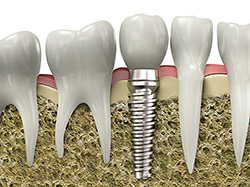In the United States, 120 million people are missing at least one tooth. These numbers may increase in the next couple of decades.
If missing teeth are not addressed health conditions may arise. These include diabetes, obesity, coronary artery disease, and certain oral cancers.
Dentures and bridges are the most common route to address failing and missing teeth. Implants, though more expensive, are becoming more commonplace. They also reveal higher success rates while providing better patient satisfaction rates.
What is a dental implant?
A dental implant is an anchor or “screw” that dentists insert into the jaw bone that acts as the new root for your tooth. A crown is then secured on top.

What is a bridge?
Bridges replace missing teeth by “bridging” the empty pockets where missing teeth once were. Dentists shave down surrounding teeth and secure porcelain crowns over the gaps. There are removable bridges as well as fixed bridges. There are also bridges that can be secured with dental implants.
What are dentures?
Dentures are completely removable appliances made for the patient after dentists remove all teeth. There are also partial dentures that can be placed over preserved teeth.

What makes dental implants a better option than these alternatives?
Let’s discuss the pros of dental implants compared to dentures and bridges.
- Dental implants are the ONLY permanent solution, working successfully 96.8% of the time after ten years.
- Dental implants may help prevent bone loss. After losing a tooth, the jaw bone in that area weakens.
- Dental implants do not damage surrounding teeth as in the case with bridges.
- Dental implants feel more natural compared to dentures. According to a questionnaire study out of a group of 400 patients, 94% “reported a high degree of satisfaction with their dental implants 8-14 years after the treatment.”
- Dental implants are more cosmetically appealing. Jaw bone loss may result in a “sunken-in” appearance. Dental implants can protect the structural integrity of your face.
- Dental implants promote a better quality of life compared to dentures. Patients have reported that chewing and speaking abilities surpass those with dentures.
- Dental implants may reduce the risk of nutritional deficiencies that may arise with dentures. This is due to an inability to chew certain foods.
- Dental implants promote healthier blood flow to gums. Dentures stifle blood flow which may promote further deterioration of the jaw.
Many of our patients have already tried bridges and dentures before they end up visiting our office.
Our goal is to educate our patients early before they realize all the issues that may come with bridges and dentures.
Dr. Gates DDS at Custom Dental of McKinney states, “Many patients come to me only seeking interest in dentures because they’re the most economical decision. I always want to set realistic expectations with dentures so I tell them the best a denture will ever be is a wooden peg.”
“The best a denture will ever be is a wooden peg.” - Dr. Bryce Gates DDS
Regardless of their success, dental implants may not be for everyone. Here are some things to consider when it comes to dental implants:
- They are more expensive and insurance may not cover them.
- It is a more extensive surgical procedure that may take six months to a year.
- Dental implants may be contraindicated in certain disorders such as certain clotting disorders, bone disease, cancers, uncontrolled diabetes, and if you are a heavy smoker.
There are still risks such as implant failure or bleeding complications though these are minimal.
In conclusion, it is best to discuss your specific situation with our doctors here at Custom Dental. We are always here to guide you to the decision that is best for your health and that best aligns with your individual needs.
Pictures: https://www.offislanddental.com/service/dental-bridge-vs-dentures/
Sources:
Biotechpossibilities.com
https://www.gotoapro.org/facts-figures/

 Website Powered by Sesame 24-7™
Website Powered by Sesame 24-7™